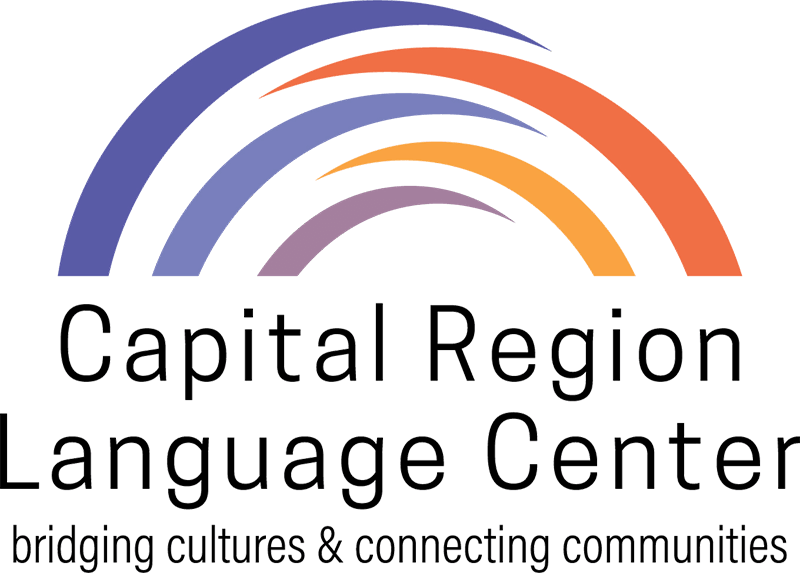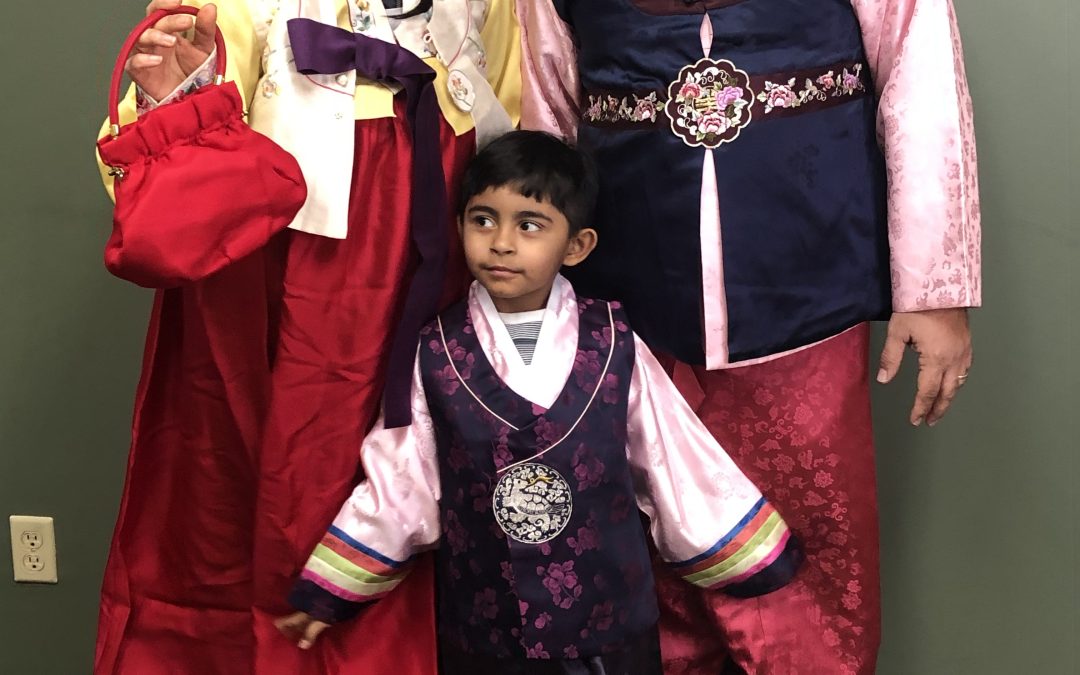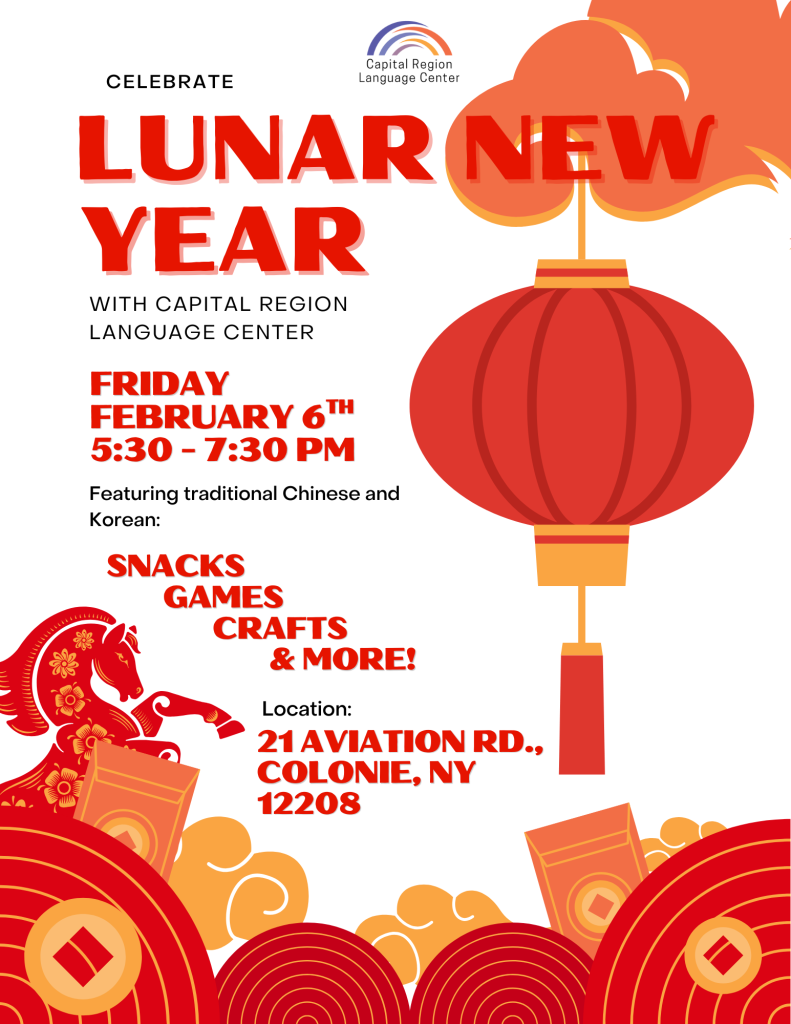Korean language teachers at Capital Region Language Center host a Lunar New Year celebration. This year, they welcomed 2023, the “Year of the Rabbit.” Open to students studying any of the 12 languages offered at CRLC, the annual event introduces traditions associated with the holiday.
The Lunar New Year celebrates spring and the beginning of a new year on the lunisolar calendar. It is also the most important holiday in China. Lunar New Year is also observed in South Korea, Vietnam, and other countries with a significant Chinese population. While official dates vary, the celebration often last for several days. It is considered a time of year to travel, gathering with immediate and extended family.
Known as the Spring Festival in China (or Chūnjié in Mandarin), Koreans call it Seollal. In Vietnam, they celebrate Tết. At the Capital Region Language Center Lunar New Year celebration, students are invited to to:
Play Yut Nori
Playing the board game Yut Nori is considered a deep tradition of the Lunar New Year celebration. Often treated as a social event, onlookers and team members shout loudly, encouraging each other, or wishing for a certain score. Scores of yut and mo are rare and get the biggest crowd reaction. Played in almost every Seollal gathering, Yut Nori can be found in most regions of the world where there is a significant Korean population.
The game consists of a board (mal-pan) that is typically made of stitched cloth. While the modern board is rectangular, there is a round variation. Four straight courses and two diagonal ones are on the board and instead of dice, yut-sticks are used. Similar to those used in the Egyptian board game Senet, there are also small tokens (marks) used for the game. These are called mal which translates to “horse.” Played between two partners or two teams who take turns, each person casts the sticks in turn, then moves a mal according to the score achieved. Yut is often played for three or more wins.
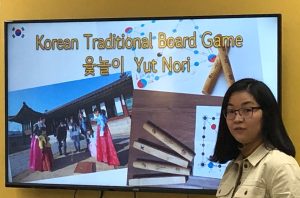
Explaining the rules of traditional Korean Lunar New Year game, Yut Nori. Two players typically play the board game, which uses yut-sticks and marks to score.
Eat Tteokguk (Korean Rice Cake Soup)
Capital Region Language Center students are offered tteokguk, a traditional Korean rice cake soup. Typically served during the Korean New Year, it is believed to offer good luck for the months head.
The soup includes a broth or guk, filled with thinly sliced rice cakes or tteok. It is often garnished with thin julienned cooked eggs, marinated meat, gim (dried seaweed) and sesame oil. The origin of eating tteokguk on New Year’s Day is unclear. However, tteokguk is believed to signify purity and cleanliness. As a result, eating the dish on the holiday grew into a ritual for starting off the New Year with good fortune.
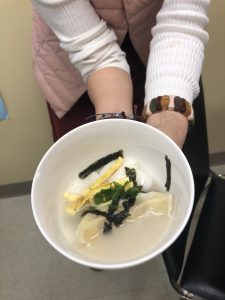
Sampling tteokguk, or traditional Korean rice cake soup.
Try on a Hanbok, the Traditional Korean Lunar New Year Costume
More fancy than the hats and noisemakers associated with American New Year celebrations, Korean teachers invite students to try on a traditional Korean Lunar New Year costume. Known as a hanbok, multiple pieces are made of embroidered cotton or silk.
Worn by men and women, it is also a traditional wedding outfit and has played an important role in the Lunar New Year holiday. While less common today, family members traditionally gather in a new set of hanbok. They bow to each other, wishing good health and fortune in the year ahead.
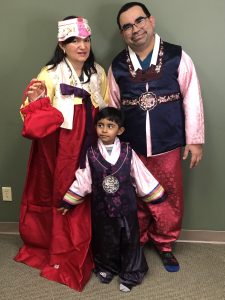
A hanbok is a traditional outfit of multiple pieces, made of embroidered cotton or silk. It is typically worn on the Lunar New Year and for weddings.
Learn Chinese Zodiac Signs
At the celebration, each person could learn their Chinese Zodiac Sign. The Chinese zodiac, or Sheng Xiao, is a repeating 12-year cycle of animal signs with specific attributes. This year, 2023, is the Year of the Rabbit.
Based on the lunar calendar, the animals, in order, include: rat, ox, tiger, rabbit, dragon, snake, horse, sheep, monkey, rooster, dog, pig. A person’s Chinese Zodiac sign is based on the year of their birth. And the Lunar New Year, or Spring Festival, marks the transition from one animal to the next.

The Chinese zodiac, or Sheng Xiao, is a repeating 12-year cycle of animal signs with specific attributes. A person’s sign is determined by the year of birth.
For 20 years, Capital Region Language Center has been providing local, personalized, expert language instruction for children, adults and businesses. We also seek to bridge cultures and connect communities through celebrations and learning opportunities. Contact us to learn more about our classes. You can also follow CRLC on Facebook for upcoming events and celebrations.
